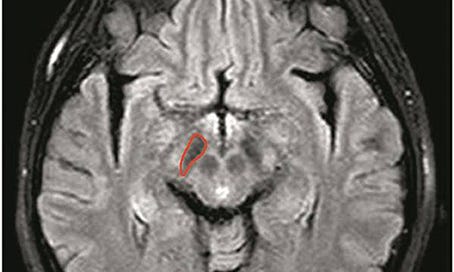What is Parkinson’s Disease?
Parkinson’s Disease is a degenerative neurological disorder that presents slowly with a tremor, muscle rigidity, slowness, and increasing difficulty walking. As the disease progresses, it often causes depression, anxiety, and dementia. The root cause of the disease isn’t completely understood. But it’s likely a combination of environmental exposure and genetic susceptibility. We do know that there is a loss of nerve cells in part of the brain called the substantia negra, which is responsible for creating a chemical called dopamine. Dopamine is the neurotransmitter that motivates behaviour, and is involved in regulating movement. There’s no cure for Parkinson’s, but there are treatments to reduce the symptoms. Medications such as levodopa replace the missing dopamine. A surgical treatment called Deep Brain Stimulation (DBS) stimulates the brain to make more dopamine. It’s a relatively common disease, with 1 in 500 people being affected.
Joy Milne
Joy is a retired nurse from Perth, Scotland. And she has an incredible skill; she can smell Parkinson’s disease. Yep, that’s right, she can smell Parkinson’s disease. Joy was married to Les, a Consultant Anaesthetist in the NHS. He was diagnosed with Parkinson’s disease at the age of 45, which is younger than average. Most people are diagnosed over the age of 60, but about 1 in 20 people are diagnosed with Parkinson’s under the age of 40. Les passed away in 2015. Several years before Les was diagnosed with the condition, Joy noticed something strange. He started to smell different. Joy describes it as an unpleasant ‘musky’ smell. She didn’t think anything of it at the time.
It wasn’t until she attended a Parkinson’s event with Les many years later that she noticed that she could smell that same musky odour on many of the other people with the disease. Joy reached out to Dr Tilo Kunath at the University of Edinburgh and shared her experience, not knowing what he would think.
Dr Kunath was initially skeptical
“It just didn’t seem possible. Why should Parkinson’s have an odour?”
He later changed his mind when he learnt that dogs can smell biomarkers for lung cancer at the 2019 Experimental Biology meeting. He contacted Joy and agreed to set up an experiment.
The Experiment
Dr Kunath designed a simple experiment to test whether Joy really could smell Parkinson’s. They recruited six people with Parkinson’s and six people without (the ‘control’ group).
They asked these 12 people to wear a t-shirt for the day and then drop it off at the lab. Joy was then asked to smell it and decide whether the wearer had the disease.
The results were incredible.
Joy almost got a perfect score. Out of the 12 T-shirts, she was correct on 11 of them.
The only error was a false positive - she identified one of the control group as having Parkinson’s when they didn’t. But Joyce was correct. That person in the control group was diagnosed with Parkinson’s three months later.
”She was telling us this individual had Parkinson’s before he knew, before anybody knew,” - Dr Kunath
In 2019, they published a scientific paper together, again with a Parkinson’s group and a control group. Joy could definitely smell Parkinson’s. The sweat seemed to have characteristic patterns of compounds on mass spectrometry.
Discovery of Volatile Biomarkers of Parkinson’s Disease from Sebum
Further Work
Dr Kunath approached Dr Barran of the University of Manchester to isolate the specific compounds causing the smell. They ran a larger trial using more sophisticated mass spectrometry Sebum: A Window into Dysregulation of Mitochondrial Metabolism in Parkinson’s Disease, which was funded by a Michael J. Fox research grant. They found 10 compounds linked to Parkinson’s disease.
The future
Doctors still diagnose the condition in the same way that Dr. James Parkinson did in his 1817 essay.
Further research is needed to convert this discovery into a noninvasive test for Parkinson’s. But imagine, in the not-too-distant future, a patient could have a simple swab taken of their skin and analysed to tell them if they have Parkinson’s.
This wouldn’t have been possible without Joy Milne and her ‘super-smeller’ nose.
If you enjoyed this article, it would really help if you subscribe & share





